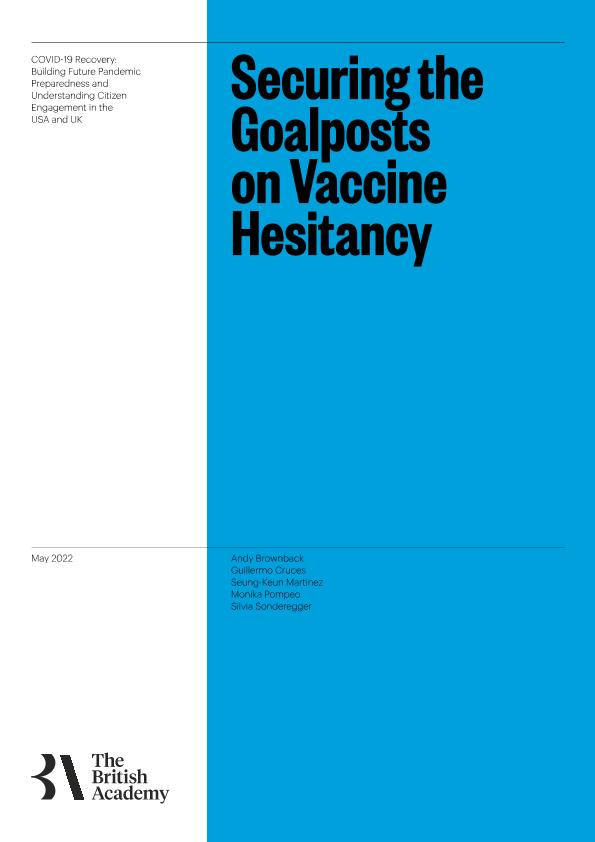Mostrar el registro sencillo del ítem
dc.contributor.author
Brownback, Andy
dc.contributor.author
Cruces, Guillermo Antonio

dc.contributor.author
Martinez, Seung Keun
dc.contributor.author
Pompeo, Monika
dc.contributor.author
Sonderegger, Silvia
dc.date.available
2023-10-19T18:51:55Z
dc.date.issued
2022-05
dc.identifier.citation
Brownback, Andy; Cruces, Guillermo Antonio; Martinez, Seung Keun; Pompeo, Monika; Sonderegger, Silvia; Securing the Goalposts on Vaccine Hesitancy; British Academy; British Academy Working Papers; 5-2022; 1-24
dc.identifier.issn
2567-7594
dc.identifier.uri
http://hdl.handle.net/11336/215490
dc.description.abstract
In this project, we quantitatively assessed how vaccine hesitancy is influenced by (i) a lack of information on COVID-19 and its vaccines, and (ii) politically-motivated reasoning or exposure to misinformation. We tested scalable interventions to address both of these potential causes of vaccine hesitancy using a large-scale (n=8000) randomized control trial run on unvaccinated populations in both UK and US. The key outcomes of this trial were attitudes towards vaccination and willingness to seek further information. Our first intervention addressed information gaps through a series of comprehensive but accessible animated videos about COVID-19 and its vaccines. For both the UK and US, we found that these videos cause positive changes in attitudes towards vaccines and intentions to be vaccinated. Furthermore, we observed that a large share of participants (approximately 60%) engaged in further information seeking by watching additional (non-compulsory) videos on COVID-19 vaccination. Our second intervention addressed politically-motivated reasoning by adapting the communication tools of “Paradoxical Reasoning” which were developed to unfreeze entrenched beliefs in the context of the most intractable conflicts (e.g., the Israeli-Palestinian border conflict). In our US sample, we found that this communication method caused positive changes in vaccine intentions. In contrast, in the UK, it had no effect (and even a negative effect in some dimensions). In addition to effective interventions, we developed a metric of motivated reasoning that we hope will allow healthcare providers to identify which individuals are more likely to be resistant to standard information provision about the vaccine. We validate this metric by showing its predictive validity for individual attitudes towards the vaccine.
dc.format
application/pdf
dc.language.iso
eng
dc.publisher
British Academy
dc.rights
info:eu-repo/semantics/openAccess
dc.rights.uri
https://creativecommons.org/licenses/by-nc-sa/2.5/ar/
dc.subject
VACCINE HESITANCY
dc.subject
BEHAVIORAL ECONOMICS
dc.subject.classification
Economía, Econometría

dc.subject.classification
Economía y Negocios

dc.subject.classification
CIENCIAS SOCIALES

dc.title
Securing the Goalposts on Vaccine Hesitancy
dc.type
info:eu-repo/semantics/article
dc.type
info:ar-repo/semantics/artículo
dc.type
info:eu-repo/semantics/publishedVersion
dc.date.updated
2023-10-17T13:12:37Z
dc.journal.pagination
1-24
dc.journal.pais
Reino Unido

dc.journal.ciudad
Londres
dc.description.fil
Fil: Brownback, Andy. University of Arkansas for Medical Sciences; Estados Unidos
dc.description.fil
Fil: Cruces, Guillermo Antonio. Universidad Nacional de La Plata. Facultad de Ciencias Económicas. Departamento de Ciencias Económicas. Centro de Estudios Distributivos Laborales y Sociales; Argentina. Consejo Nacional de Investigaciones Científicas y Técnicas. Centro Científico Tecnológico Conicet - La Plata; Argentina
dc.description.fil
Fil: Martinez, Seung Keun. University of Nottingham; Estados Unidos
dc.description.fil
Fil: Pompeo, Monika. University of Nottingham; Estados Unidos
dc.description.fil
Fil: Sonderegger, Silvia. University of Nottingham; Estados Unidos
dc.journal.title
British Academy Working Papers
dc.relation.alternativeid
info:eu-repo/semantics/altIdentifier/url/https://www.thebritishacademy.ac.uk/publications/securing-the-goalposts-on-vaccine-hesitancy/
Archivos asociados
